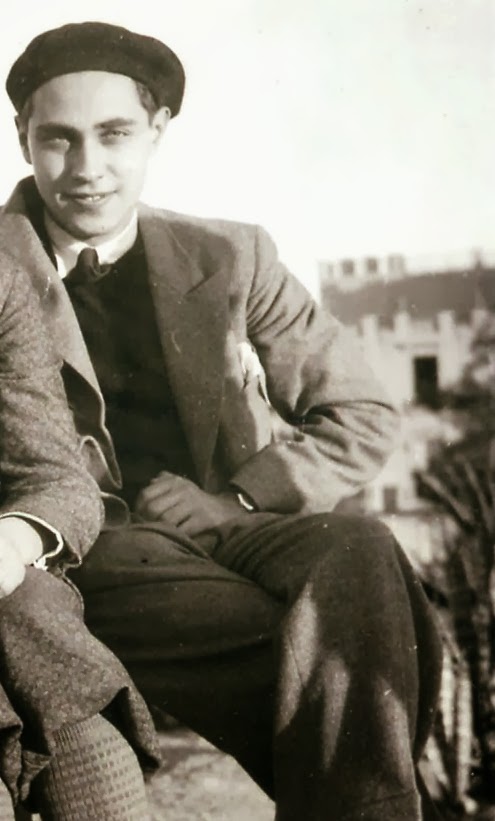Vocal artists pay worthy tribute to Viktor Ullmann
Among the many cultural victims of the Holocaust was an adventurous composer named Viktor Ullmann who had an affinity for music that the Nazis labeled “degenerate” — perhaps most famously, the breakthrough in atonality made by Arnold Schoenberg.
Ullmann, briefly a student of Schoenberg’s, was imprisoned by the Nazis and murdered at Auschwitz October 18, 1944, at age 46. Many of his works were lost, although enough survive that Ullman today is edging into repertoire alongside mainstays of early 20th Century music.
The Ullmann Project, an initiative by New York-based singer Dominique Hellsten, is designed to sustain that momentum and bring Ullman to a larger audience. A crisp solo voice and piano recital Thursday night at the Kaufman Music Center’s Merkin Concert Hall, on Manhattan’s Upper West Side, did precisely that, pairing Ullman’s unjustly neglected works with pieces by kindred composers.
Though not Schoenberg, in this case. Although the inventor of twelve-tone music was in the room, stylistically speaking, Hellsten opted instead for a program including works by a Schoenberg contemporary who also mentored Ullmann, Alexander von Zemlinsky.
Also presented on Thursday were Ullmann’s more lyrical and tradition-minded contemporary, Erich Wolfgang Korngold (likewise a Zemlinsky pupil), and, lastly, a successor of sorts who reconciled the divergent styles of Ullmann and Korngold, Petr Eben.
The decision to leave Schoenberg out was interesting, but defensible, as a way of allowing Ullmann’s music to be considered at a remove from one of its acknowledged influences.
A success in purely musical terms — employing two sopranos, two baritones and two pianists in varying combinations — The Ullman Project was also an affecting tribute to the man himself and, as soprano Hellsten noted in her introduction to Ullman’s Op. 26, a reminder to be vigilant when anti-Semitism rears its head.
Accompanied by pianist Craig Ketter, Hellsten closed the recital with Five Love Songs, Op. 26, set to love poems by German writer Ricarda Huch. Of the three Ullman song cycles performed, this was the strongest, as much for its embrace of conventional melody and harmony as for its evocative use of dissonance.
Hellsten’s big, glossy voice served her well on the darkening passages of “Am Klavier” (“At The Piano”) and on contentious “Sturmlied” (“Storm Song”). By contrast, her powers of projection sometimes got the better of her on a sexet of Zemlinsky songs from his Op. 6 Seven Songs, based on German folk melodies. Although in fairness to anyone tasked with “Liebe Schwalbe,” (“Dear Swallow”), it seems as if every flap of that little bird’s wings is assigned a volley of orchestral notes, forcing a soprano to oversing just to stay aloft.
The writing and singing of Zemlinsky was more proportional when baritone Will Robinson, with Matthew Odell on piano, performed two songs set to poems by Richard Dehmel. “Vorspiel” (“Prelude”) and “Letzte Bitte” (“Last Request”) were, in fact, two of this entire program’s most hauntingly powerful items — head-on contemplations of death, loss and grief that amounted to the teacher (who was also Schoenberg’s brother-in-law) showing his students how music is made.
Among the other performers, baritone Jason Plourde gave nimble voice to three songs from Ullmann’s Op. 37, including the feisty “Die Schweizer,” (“The Swiss Guard”) based on a 19th Century poem about the Battle of Murten in 1476 (and an odd instance of Western culture hailing Swiss military prowess).
Soprano Monica Niemi, with Ketter at the piano, rendered songs from Ullmann’s Op. 17 and then Korngold’s Op. 14 with fewer flourishes than her counterpart Hellsten. There was an abstracted beauty to Niemi’s incisive way with “An Himmelfahrt” (“An Ascension”), by Ullman. One can easily picture Niemi as an apt and graceful interpreter of Schoenberg’s more geometric music.
The songs from Eben, although set to verses by one of Germany’s most cherished writers, Rainer Maria Rilke, made less of an impression on Thursday. This was not because of any shortcomings by duet partners Robinson and Odell. Eben’s music, although breathtakingly beautiful in places — as with “Zum Einschlafen zu sagen” (“To Sing Someone To Sleep”) — felt a little too procedural in its efforts to bridge earlier styles. He was simply crowded out on this bill by his mighty forbears Korngold, Zemlinsky and Ullman.
The program, with additional pieces performed on organ by Hellsten collaborator Johannes Landgren, will be repeated April 18 at St. Peter’s Church in Midtown Manhattan.
